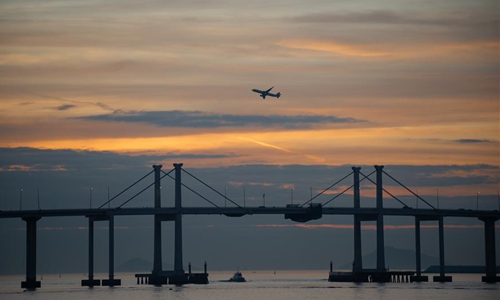HOME >> OPINION
China, world tied through development
Source:Global Times Published: 2020/1/1 18:48:06

Photo taken on December 17, 2019 shows a view of the Ponte de Amizade (Bridge of Friendship) in South China's Macao. Over the past two decades, the special administrative region has made great strides in economic development and achieved prosperity and stability under the "one country, two systems" principle. Photo: Xinhua
Editor's Note:
Over the past 70 years, China made breakthroughs in development with successful poverty alleviation. What is the decisive factor for those achievements? China aims to build a moderately prosperous society in all aspects in 2020 with comprehensive poverty alleviation. What will that mean to the world? Global Times (GT) reporter Xu Hailin talked with Bruno Maçães (Maçães), former Portuguese state secretary for European affairs, about the issues at the International Symposium on "China and the World in the New Era" organized by the Chongyang Institute for Financial Studies of Renmin University of China recently in Beijing.
GT: China has developed rapidly in 70 years, making a lot of achievements. What role has China played during that time? What do you think is the decisive factor for those achievements?
Maçães: China has become a central part of the world economy, the biggest exporter, the biggest importer and the largest trading nation. Particularly, if you look country by country, it's really quite incredible that China is the main trading partner of more than 100 countries in the world.
From the numbers I saw 25 years ago, China was the main trading partner of only maybe a dozen or so countries. It was a dramatic change. It shows that now it is not possible to remove China from the world economy. It's the growth, it's the size, but it's also how integrated China is with the world economy that makes the country indispensable.
The reason for China's achievements is hard work. You have to have hard work in the right framework of policies and institutions, realizing that one country cannot grow rich all by itself and that it needs to have access to world markets and technology.
GT: China is striving to catch up in the high-tech area. In which fields do you think China has taken the lead or is closing in?
Maçães: Very obviously, mobile payments and some financial technology. Everyone is so comfortable using the cellphone to pay, to transfer money between people without going to a bank. I think that is the most impressive because it's been slow and difficult in other parts of the world. In the US and Europe, we still use credit cards. Also, China is leading in artificial intelligence (AI) and visual recognition.
There are areas where China is moving very fast but the rest of world is moving slowly. Probably it's because here in China the society is more organized as a whole. Once there is a decision to move in a certain direction, it happens faster.
GT: Speaking of the AI technology and facial recognition, in the West there are accusations of China abusing it. What's your take on that?
Maçães: The problem is not with the technology. You need to have rule of law and you need to have guarantees that bad people are not going to use your data for illegal purposes. That should be the concern. But if we have an approach that every new technology is a bad thing, then we will never move forward.
GT: Portugal was the first country in Atlantic Europe to sign a cooperation agreement with China under the China-proposed Belt and Road Initiative. How can the China-Portugal relationship set examples for other countries that are still assessing whether they should have deeper relations with China?
Maçães: Yes. It was a big thing, and maybe Italy joined because Portugal joined before.
Portugal and China have a long history - 500 years of close contact. Macao is a good example of that. Many countries in Europe see China as a country on almost a different planet. That makes a difference. We are very relaxed about China, but many other countries have less knowledge and history with China.
GT: China aims to build a moderately prosperous society in all aspects in 2020 with comprehensive poverty alleviation. What will that mean to the world? How will the growing number of Chinese middle class influence the world?
Maçães: It is a very good example for regions that still need to solve the poverty problem, Africa and India in particular. China shows that it can be done and it can be done very quickly. It motivates people and increases the level of ambition and demands people put on their governments. The governments now cannot tell their citizens that poverty cannot be eliminated because they look to China and they see that it can. So it's a good example for the rest of the world.
Now China's middle class is becoming an engine of growth. It is a lot of money to be made if you can understand and appeal to the Chinese middle class. If you understand what the Chinese middle class wants, you can export, invest, sell, and produce more.
GT: The year of 2019 marked the 20th anniversary of China resuming sovereignty over Macao. The city realized stable growth in the past two decades, proving the "one country, two systems" principle feasible. Why does Macao achieve peace, prosperity and stability, while Hong Kong is troubled by unrest?
Maçães: Remember that Macao and Hong Kong have completely different histories. Hong Kong was a colony that resulted from war. But the Portuguese presence in Macao was always accepted. Portugal was present as jurisdiction, but sovereignty stayed with China until the late 1880s.
After China resumed sovereignty over Macao in 1999, many people from the Chinese mainland moved to Macao. Despite the different system, psychologically and culturally, Macao integrated within China's development more quickly than Hong Kong, which has a very long, very troubled history.
Posted in: VIEWPOINT,DIALOGUE